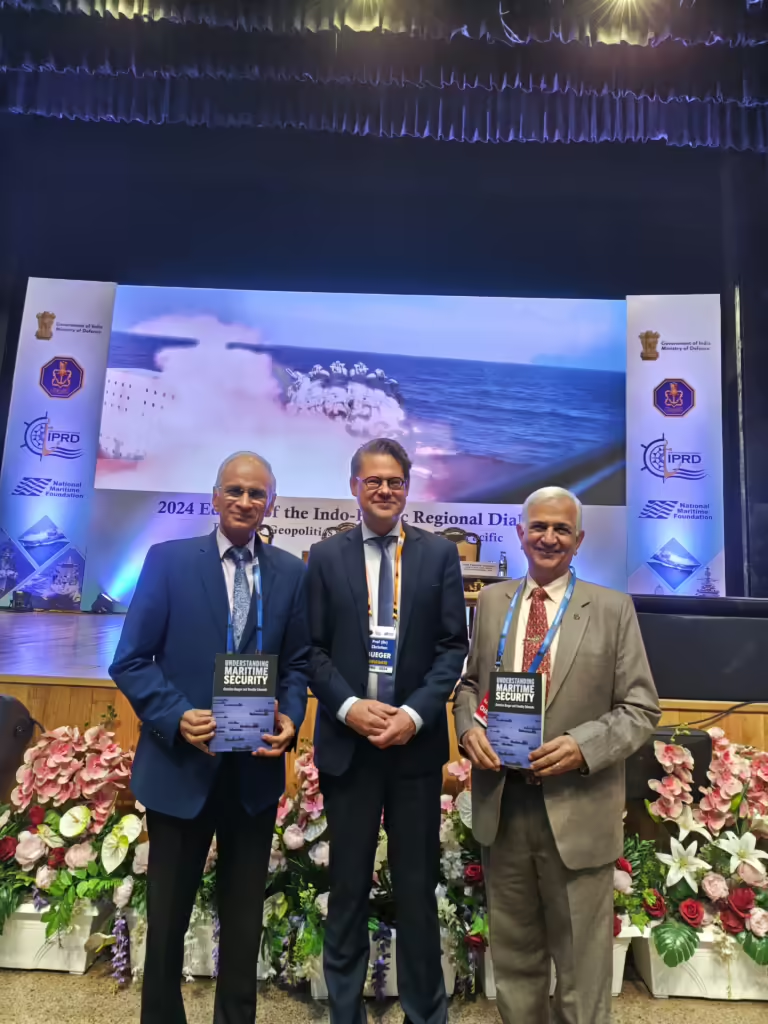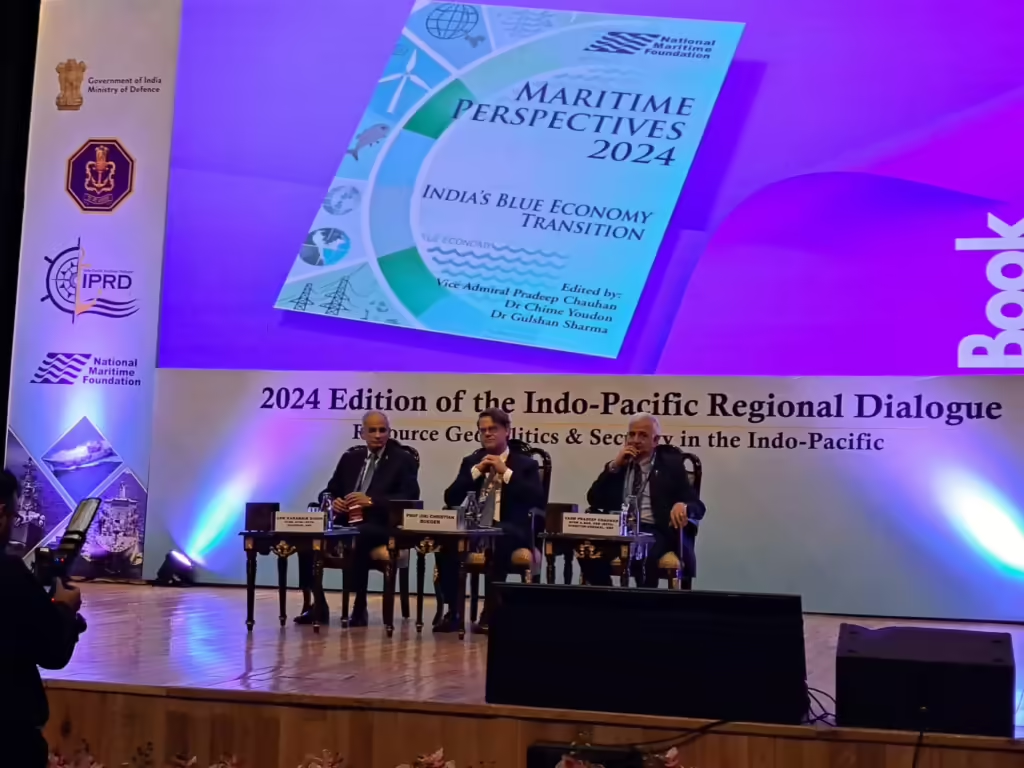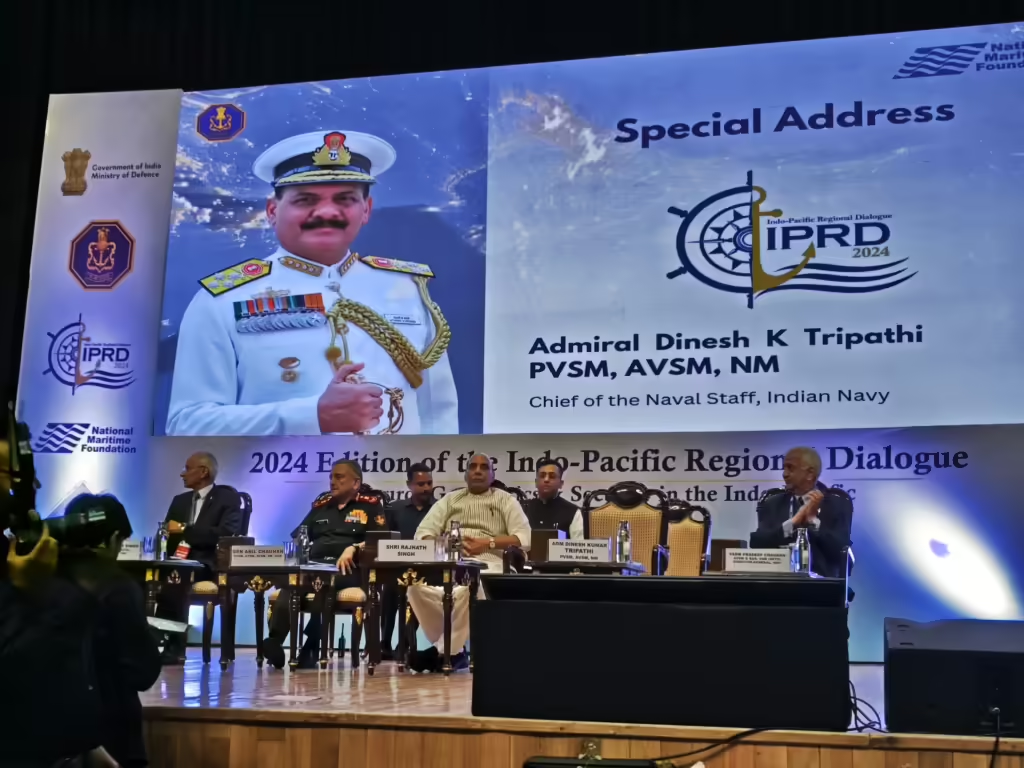The Indo-Pacific Regional Dialogue (IPRD) is one of the major strategic dialogue formats in India. Organized as a collaboration between the Indian Ministry of Defense, the Indian Navy and the National Maritime Foundation it focuses on the maritime domain.
One of the key purposes of the forum is to discuss the Indian maritime policy of SAGAR – Security and Growth for All in the Region – and advance its related action plan known as the Indo-Pacific Oceans Initiative (IPOI).



I had the pleasure to attend the 2024 dialogue in October and to deliver one of the special addresses at the event. Here is the script of my talk which investigated the future of maritime security in the region:
Maritime security: trends and frontiers, talk given at the 2024 Indo-Pacific Regional Dialogue, New Delhi, 4.10.2024.
Excellencies, officers, colleagues, friends,
Since we started to think in terms of the Indo-Pacific in the 2010s, the debate has come a long way. Indeed, the Indo-Pacific debate has become an engine room for strategizing what we mean by maritime security and what priorities we should be setting.
It is my immense pleasure to deliver this special address here today. I would like to thank the organizers not only for inviting me but also for establishing this forum. We do need these kinds of high-level strategic dialogues to establish where we are, where we are heading, and how to better steer our common future.
In this address, I would like to focus on the future of maritime security. Where are we heading?
I shall draw on our book Understanding Maritime Security, written with Prof. Tim Edmunds and published by Oxford University Press in May this year. The book is a comprehensive guide and new go-to resource for maritime security. It discusses the history of maritime security from the 1990s, key challenges from state disputes to terrorism, piracy, and maritime crime. It examines who the actors are and what the key solutions are. In short, the book connects the dots.
I would also like to introduce you to the research we are doing in the Ocean Infrastructure Research Group at the University of Copenhagen. In this group, we are developing a new vision for how the oceans should be governed.
I would first like to point out three strategic trends that we must pay attention to and then outline the consequences of these trends.
3 Trends:
Trend 1: Blue acceleration and the age of infrastructure
Never before in human history have we been using the oceans as intensively as we do today. Since the 1990s, global shipping has exploded, with ships getting bigger and bigger. A third of energy comes from the sea. This number is rising with the expansion of offshore wind and solar farms and a growing underwater electricity grid. Global communication is fully dependent on thousands of kilometers of subsea data cables. Increasingly, the sea is becoming a heavily industrialized space full of infrastructure.
Many of the resources for our future are out at sea. Wind, tidal energy, and hydrogen are key ingredients of future energy. The digital expansion will also need the sea. To use AI, we need more cable connections to supercomputers. In this age of infrastructure, maritime space is becoming congested, more human-dominated, and less natural.
Trend 2: The ocean poly-crisis
We are witnessing multiple crises at sea. This is partially the outcome of the first trend. Overusing the sea has led to new vulnerabilities. Local shipping accidents, such as the Ever Given incident in the Suez Canal, have global consequences. Overfishing and pollution are consequences of blue acceleration.
There are also broader existential crises of climate change and biodiversity loss. Sea level rise, more extreme weather, and the loss of food and genetic resources follow. Pressure is on the rise, and solutions are not in sight.
Trend 3: The decline of traditional multilateralism
There is less and less appetite for global and comprehensive solutions agreed upon in international organizations and the UN system. Although multilateralism is not entirely gone, as exemplified by the new high seas treaty and the start of plastic treaty negotiations, many states favor smaller and often informal solutions. AUKUS or the Quad are perfect examples; the pragmatic configuration of the Combined Maritime Forces in the Western Indian Ocean is an operative example. In this light, finding global solutions and rules that apply to everyone has become more difficult.
Consequences
What do these three mega-trends mean for maritime security strategy and our priorities? Since time is short, let me outline three consequences:
- We need to go beyond the surface. Much of the focus of maritime security today is on ships and the surface. We need to look up and down, paying attention to what goes on in the subsea, where the most vital infrastructure is based. Uncrewed vessels, including those in airspace, are changing the landscape. Space security, cybersecurity, and maritime security are increasingly interwoven. Just consider the importance of satellites for navigation and maritime domain awareness.
- Infrastructures are vital for running the global economy and crucial in tackling climate change. The need to protect infrastructure, enhance resilience in regional systems, and ensure access to infrastructure is a new global common agenda. A key objective of contemporary maritime security must be to protect the common infrastructure of humankind.
- We need to bring back balance to maritime security governance. We have recently completed work on an assessment of global maritime security governance for the United Nations Institute for Disarmament Research (UNIDIR). The report will be released in November. The conclusion is that there is too much focus on regional and informal solutions. This has a price. There’s a lack of accountability, and we do not have the global fora to clarify the law of the sea or develop new rules. A UN steering mechanism for maritime security is missing. We need to recalibrate governance to have the optimal mix between formal and informal, and global and regional mechanisms. Above all, we need to return to the useful proposal that His Excellency Prime Minister Modi made at the UN Security Council in 2021: to develop a dedicated UN maritime security body. This is what we recommend in the UNIDIR report.
To conclude, when discussing the ocean and maritime security, we must take into account that the world looks radically different than it did 10 years ago. We need to think about maritime security beyond the surface, start caring for the common infrastructures of humankind, and recalibrate maritime security governance, particularly at the UN level.
I hope this provides some useful food for thought for our discussion. Thank you for your attention.